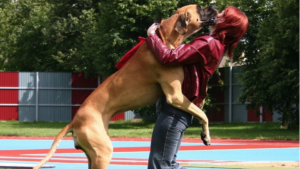If you live with a dog you may think they have a pretty good memories. After all, a dog who’s been through obedience training remembers commands and hand signals. And they always know which fences are the most fun to bark at and which shops will give them treats when they’re out for a walk. But do dog memories work the same way as human memories? The answer is no, not really, but sometimes. Read on to learn how your dog’s memory works, and find links to research and more info. Associative memory helps dogs remember their favourite things

When you consider taking a walk, you most likely recall explicit strolls you’ve taken previously. You may reflect in your inner consciousness on a specific way, or review the time it sprinkled while you were out for a walk. Mutts don’t generally feel that way—inquire about shows, truth be told, that they have almost no immediate review. Rather, hounds have cooperative memory. Pooches recall individuals, places, and encounters dependent on affiliations they have with them. For instance, they may “recollect” strolls as a result of their relationship with your strolling shoes and get energized when they see you putting those shoes on.

You can change your pooch’s acquainted recollections after some time. Truth be told, that is a major piece of preparing! Consider how you acquaint your pooch with new individuals. In the event that you welcome somebody over and have them give your canine constructive consideration and treats, your pooch will connect that individual with positive consideration and treats. They may not “recall” your visitors a similar way you recollect them, yet they will shape affiliations. Do mutts recollect terrible encounters? In spite of the fact that pooches don’t have a similar sort of memory as we do, they can shape negative affiliations that we may translate as “terrible recollections.” For instance, does your canine demonstration frightful in the lounge area at the vet’s office? On the off chance that she’s had a negative involvement with the vet, she may not recall precisely what terrified her so much, however she connects the lounge area with that dread. You can help mutts conquer negative relationship by supplanting them with positive encounters. For instance, take a couple of “fun” outings to the vet’s office where they don’t need to be analyzed. Lamentably, the more grounded the affiliation, the harder it is to change the memory. Does my canine met me?

You probably remember the first day your dog came home to live with you. But does your dog remember when they met you for the first time? The short answer is, they probably don’t. But that doesn’t mean they don’t remember you. Dogs may have some type of episodic memory, or the ability to remember specific events in the past. A recent study suggests this is possible. However, the same study shows that there are real limits to that type of memory for dogs. So your dog is probably not able to reflect back on your first moments together in the same way you do. However, their associative memories mean that they know who you are, and they know they like you! They are also strongly affected by smell, as detailed in the latest book by canine cognition expert Alexandra Horowitz. Indeed, a dog’s sense of smell helps them recognise and “remember” you. Come on. I know my dog remembers specific events! Just because dogs lack episodic memory doesn’t mean they can’t remember anything that ever happened to them. It’s just that the vocabulary around animal memory is necessarily different than that around human memory. Episodic memory has to do with the “sense of self.” Our memories contribute to how we understand ourselves and our experiences in the world. But because dogs aren’t verbal, it’s very hard for humans to understand whether they have a similar sense of self. However, recent studies show that dogs may have episodic-like memories. In a 2016 study conducted at the Family Dog Project at Eötvös Loránd University in Budapest, researchers found that dogs can remember events they witness (in this case, an action performed by a trainer). However, as far as researchers can tell, they don’t retain those memories for very long. So dogs may have short-term, episodic memory, but their associative memories stick with them longer. Don’t worry, your dog won’t forget you
